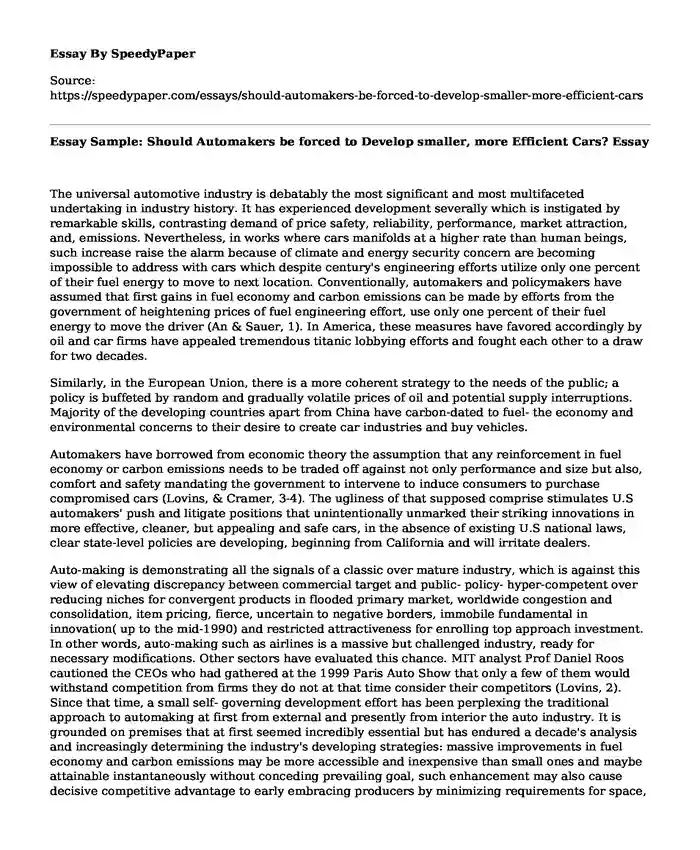
| Type of paper: | Problem solving |
| Categories: | Automotive industry |
| Pages: | 3 |
| Wordcount: | 824 words |
The universal automotive industry is debatably the most significant and most multifaceted undertaking in industry history. It has experienced development severally which is instigated by remarkable skills, contrasting demand of price safety, reliability, performance, market attraction, and, emissions. Nevertheless, in works where cars manifolds at a higher rate than human beings, such increase raise the alarm because of climate and energy security concern are becoming impossible to address with cars which despite century's engineering efforts utilize only one percent of their fuel energy to move to next location. Conventionally, automakers and policymakers have assumed that first gains in fuel economy and carbon emissions can be made by efforts from the government of heightening prices of fuel engineering effort, use only one percent of their fuel energy to move the driver (An & Sauer, 1). In America, these measures have favored accordingly by oil and car firms have appealed tremendous titanic lobbying efforts and fought each other to a draw for two decades.
Similarly, in the European Union, there is a more coherent strategy to the needs of the public; a policy is buffeted by random and gradually volatile prices of oil and potential supply interruptions. Majority of the developing countries apart from China have carbon-dated to fuel- the economy and environmental concerns to their desire to create car industries and buy vehicles.
Automakers have borrowed from economic theory the assumption that any reinforcement in fuel economy or carbon emissions needs to be traded off against not only performance and size but also, comfort and safety mandating the government to intervene to induce consumers to purchase compromised cars (Lovins, & Cramer, 3-4). The ugliness of that supposed comprise stimulates U.S automakers' push and litigate positions that unintentionally unmarked their striking innovations in more effective, cleaner, but appealing and safe cars, in the absence of existing U.S national laws, clear state-level policies are developing, beginning from California and will irritate dealers.
Auto-making is demonstrating all the signals of a classic over mature industry, which is against this view of elevating discrepancy between commercial target and public- policy- hyper-competent over reducing niches for convergent products in flooded primary market, worldwide congestion and consolidation, item pricing, fierce, uncertain to negative borders, immobile fundamental in innovation( up to the mid-1990) and restricted attractiveness for enrolling top approach investment. In other words, auto-making such as airlines is a massive but challenged industry, ready for necessary modifications. Other sectors have evaluated this chance. MIT analyst Prof Daniel Roos cautioned the CEOs who had gathered at the 1999 Paris Auto Show that only a few of them would withstand competition from firms they do not at that time consider their competitors (Lovins, 2). Since that time, a small self- governing development effort has been perplexing the traditional approach to automaking at first from external and presently from interior the auto industry. It is grounded on premises that at first seemed incredibly essential but has endured a decade's analysis and increasingly determining the industry's developing strategies: massive improvements in fuel economy and carbon emissions may be more accessible and inexpensive than small ones and maybe attainable instantaneously without conceding prevailing goal, such enhancement may also cause decisive competitive advantage to early embracing producers by minimizing requirements for space, capital, assembly, capital among others. This could allow a strong business model grounded solely on value to purchasers and advantage to manufactures. Moreover, it may facilitate advantageous changes in fuel infrastructure that fulfill security and climate targets at costs similar to or lower than present's and allow a smooth and cost-effective transition from currently property base. Realizing these goal needs leadership rather than a regulatory adherence mindset and a total shift in how vehicles are designed - a technological change as striking as those began to modify present's auto industry nearly a century ago.
In this opinion, mow usually becoming to a majority in the sector, a technological shift will be organic and irregular, shocking developments in fuel economy will be fewer effects of fuel price than developing by-products of innovation in the engineering field. Hence consumers will prefer the new versions rather than needing government incentives to purchase less attractive cars or costlier since they will provide superior traits at comparable costs. To obtain the innovation, automakers would concentrate less on, lawsuit, and, public relations than on engineering.
Work Cited
An, Feng, and Amanda Sauer. "Comparison of passenger vehicle fuel economy and greenhouse gas emission standards around the world." Pew Center on Global Climate Change 25 (2004). Retrieved from: https://pdfs.semanticscholar.org/1479/b8a90f3255f29acd6fb19ec00071379c296d.pdf
Lovins, A. B. Advanced Light Vehicle Concepts. (1991): 1-34. Retrieved from: https://pdfs.semanticscholar.org/e9fe/0abf423321b3a1509003eb2ef6e9d1b99804.pdf
Lovins, Amory B., and David R. Cramer. "Hypercars, hydrogen, and the automotive transition." International Journal of Vehicle Design 35.1-2 (2004): 50-85.Retrieved from: http://www.efchina.org/Attachments/Report/reports-efchina-20050702-2-en/Fuel_Economy_and_GHG_Standards_comparison_en.pdf
Cite this page
Essay Sample: Should Automakers be forced to Develop smaller, more Efficient Cars?. (2022, Nov 27). Retrieved from https://speedypaper.net/essays/should-automakers-be-forced-to-develop-smaller-more-efficient-cars
Request Removal
If you are the original author of this essay and no longer wish to have it published on the SpeedyPaper website, please click below to request its removal:
- Moving Companies Essay Samples
- Essay Example for Students: The Art and Cinema as Cultural Diplomacy
- Free Essay Example: Transition into the Nursing Role
- Essay Example: Privacy, Consent, and Confidentiality Issues in Biomedical and Biological Research
- The Liberal Tantrums: A Book Review of "The Once and Future Liberal" by Mark Lilla
- Free Essay Sample on the Epistemology of Modern Digital Media
- Free Essay: Hip-Hop and Its Popularity
Popular categories




